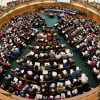Should Christian leaders pronounce on political positions?
Last week, Archbishop Justin Welby published an article in the Daily Mail in which he argued that wealthier families should pay more tax in order to reduce the widening levels of inequality in contemporary Britain. His comments accompanied the report of a ‘think tank’ group he has been part of, the ‘left leaning’ Institute for … Continue Reading


































